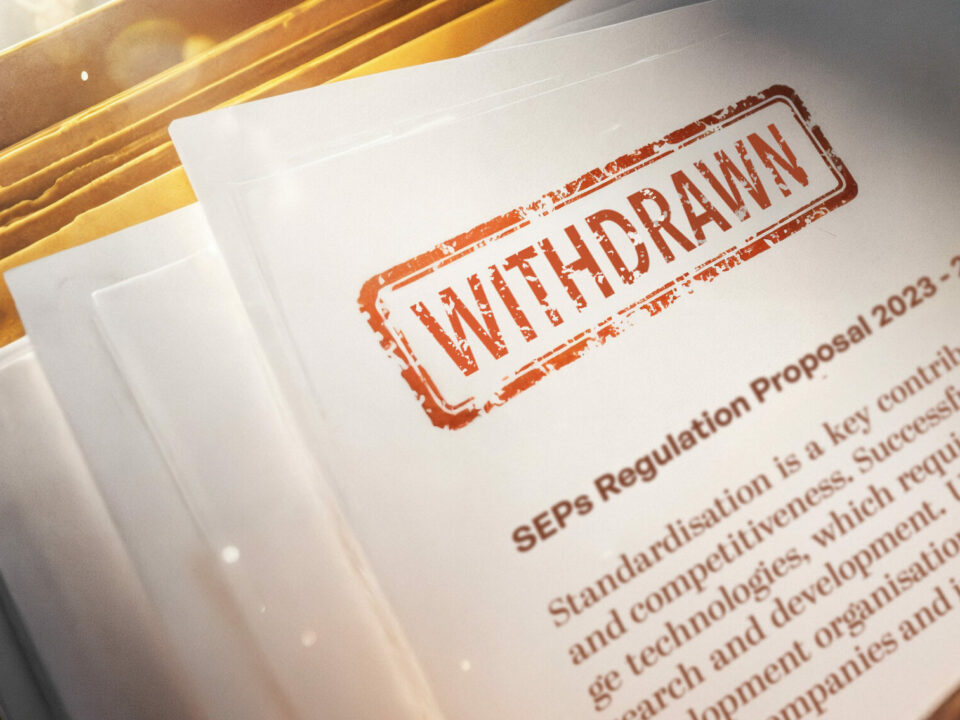A (bad) solution in search of a problem – Part I
Did the European Commission cherry-pick the data it needed to achieve the result it wanted on standard-essential patents (SEPs)?
The licensing of SEPs can be a contentious issue. Implementers of the cellular standards think that SEP owners use their market power to extract excessive rents or terms from licensees (“hold-up”). SEP holders complain when implementers refuse to conclude fair, reasonable and non-discriminatory (FRAND) licenses in a timely manner (“hold-out”).
To get to the bottom of this problem, in 2017 the European Parliament requested that the Commission monitor and document instances of hold-up and hold-out to see where the problem was.[1] In other words, the European Parliament was asking the Commission to collect objective evidence of hold-up and hold-out. This could inform regulatory proposals. More recently, MEP Andreas Schwab posed questions on the impact of hold-up. The Commission has neither gathered this data nor answered the Parliament’s questions.
Survey reaches a foregone conclusion
Instead, the Commission largely relied upon opinions in developing its controversial SEPs proposal. The Commission surveyed industry about hold-up and hold-out asking questions such as the following.
“Do you consider that the current legal framework for SEPs provides a sufficient legal protection against ‘”hold-up’”?
“Do you consider that the current legal framework for SEPs provides sufficient legal protection against “hold-out”?
The problem with this type of ‘survey’ data is that it is inherently subjective: the response depends upon the respondent’s commercial point of view. Thus, implementers that have to pay license fees will suggest that hold-up is a problem while SEP holders that are entitled to receive payment will suggest that hold-out is a problem. Of course, since there are many implementers of a standard, and just a few SEP owners, this type of survey data will always suggest that hold-up is a greater problem than hold-out.
And that is apparently exactly what happened since DG GROW’s SEP proposal only addresses the problem of hold-up and not that of hold-out. But is there any objective evidence that hold-up is a problem? To answer this question, the Commission engaged a group of academics to analyse this issue. Their report was published[2] after the Commission’s SEP proposal and its conclusion is eye-opening.
Existing empirical evidence on the causal effects of current SEP licensing conditions is largely inconclusive. Empirically observable outcomes do not indicate the existence of pervasive “opt-out” from standards-related innovation as a consequence of SEP licensing conditions, i.e., it does not appear that the observed challenges in SEP licensing are sufficiently severe as to systematically discourage potential contributors from participating in standards development or discourage potential implementers from creating products that use technology standards subject to potential SEPs.[3]
The evidence does not support regulatory intervention
While the language is quite academic, what this is saying is that objective evidence does not support the notion that hold-up is a problem that justifies regulatory intervention—exactly the kind of evidence the European Parliament had asked the Commission to find five years earlier.
At a meeting in March before a business association, DG GROW’s Director General Kerstin Jorna was asked about the standard-essential patents initiative. She responded that the Commission had to act because the Commission received a large number of complaints. Those complaints come mostly from large implementers of the cellular standards such as U.S. tech giants and automakers—again, a purely subjective and predictable result coming from companies that are net payers of license fees. So, the Commission appears to have decided to proceed with regulation despite there being no objective evidence of a problem requiring regulatory intervention.
On 27 April 2023 the Commission adopted its initiative on standard-essential patents (SEPs). This proposal will now be scrutinized by the European Parliament and the European Council (i.e. the Member States of the European Union). Given the lack of evidence justifying the intervention, we encourage them to ask questions, conduct their own impact assessments, conduct their own legal analyses, and offer amendments. And though rare, if they view the proposal as not fit for purpose, they can send it back to the Commission for a rethink.
We think they should. The Commission should withdraw its proposal and update its impact assessment before creating a costly new bureaucracy to solve a problem that has yet to be identified.
This is the first in a series of blog posts that will look at different examples of cherry picking and foregone conclusions in the context of the Commission’s proposed new rules on standard-essential patents.
[1] The Parliament has previously called on the Commission “to publish biannual reports evidencing actual cases of: (a) unlicensed SEP use (i.e., infringements) lasting for 18 months or more; and (b) issues regarding access to standards due to systematic non-compliance with FRAND commitments”. EU Parliament resolution of 4 July 2017 on European standards for the 21st century (2016/2274(INI)). Available here: https://www.europarl.europa.eu/doceo/document/E-9-2023-000530_EN.html
[2] https://www.iplytics.com/wp-content/uploads/2023/04/Empirical-Assessment-of-Potential-Challenges-in-SEP-Licensing.pdf
[3] Ibid at page 185.




